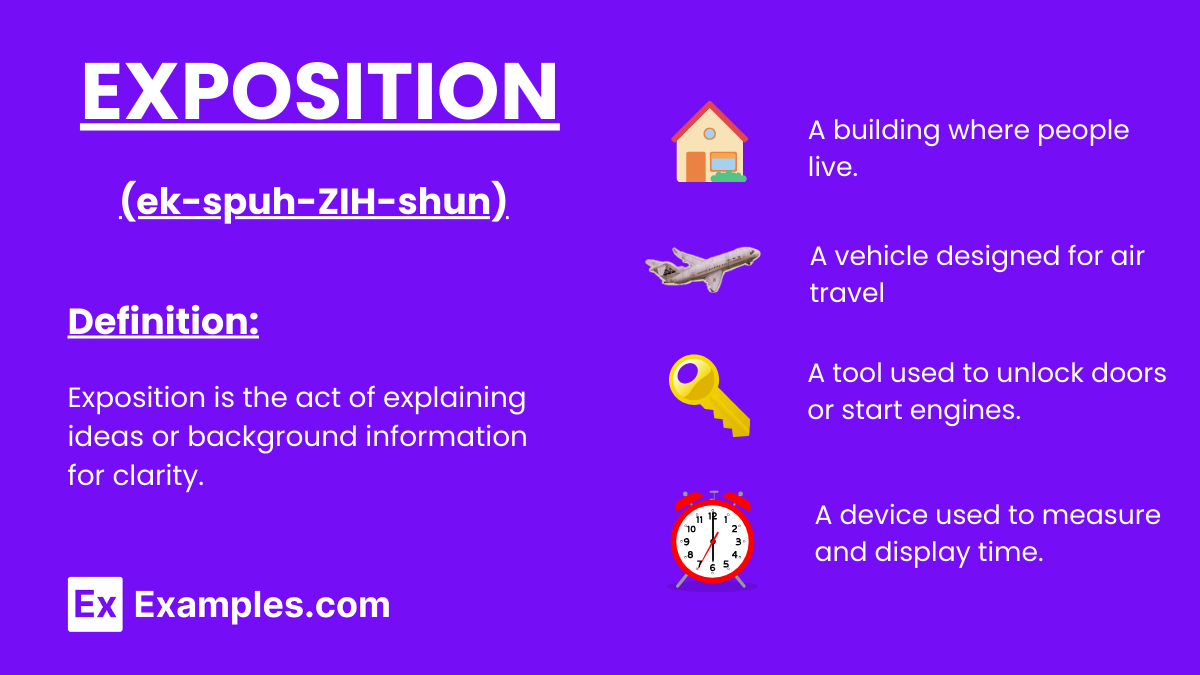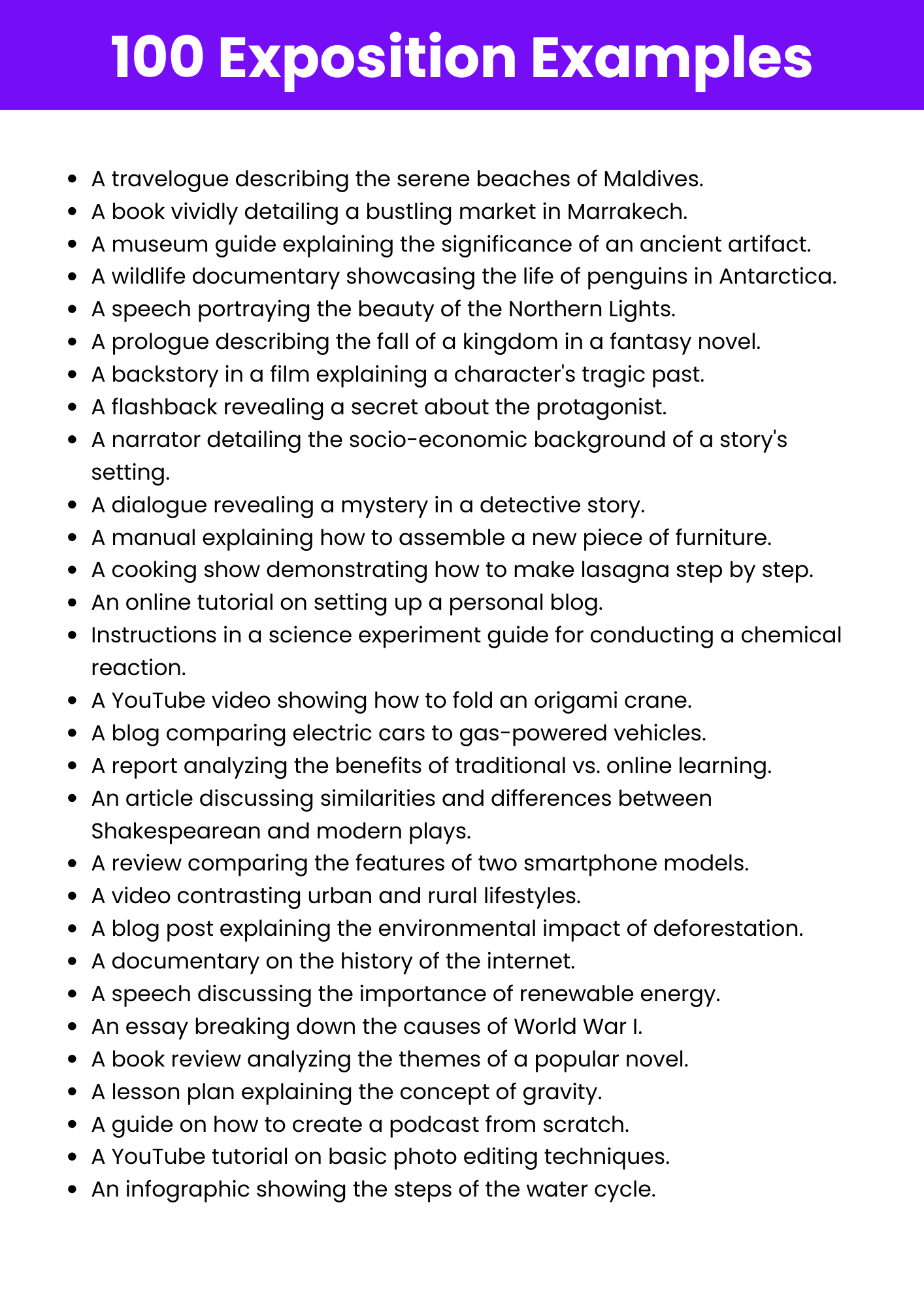Exposition
What is Exposition? – Definition
Exposition refers to the detailed explanation or description of an idea, concept, or background information, aimed at clarifying or providing context for better understanding.

Generated Exposition Examples

Download Exposition Examples
Enhance your understanding with our comprehensive PDF guide.
Download PDFExamples of Exposition
- A history book explaining the events of World War II.
- A teacher describing the process of photosynthesis.
- A documentary detailing the life cycle of a butterfly.
- A manual outlining how to assemble furniture.
- A science lecture explaining Newton’s laws of motion.
- A tutorial on how to bake a cake.
- An encyclopedia entry about the planet Mars.
- A blog post explaining the benefits of meditation.
- A guide on how to plan a budget-friendly vacation.
- A news article explaining the causes of climate change.
- A user manual for a new smartphone.
- An online course explaining the basics of coding.
- A recipe detailing how to make homemade pizza.
- A scientific paper explaining the water cycle.
- A presentation on the benefits of renewable energy.
- A documentary explaining the evolution of mammals.
- A workshop on how to improve public speaking skills.
- An article explaining how vaccines work.
- A YouTube video explaining the basics of photography.
- An FAQ section explaining the features of a product.
- A blog explaining the differences between two diets.
- A classroom lecture explaining the causes of World War I.
- An infographic explaining the benefits of exercise.
- A website explaining the effects of deforestation.
- A public speech explaining the importance of voting.
- A handbook explaining workplace safety protocols.
- A seminar on how to write compelling stories.
- A tutorial explaining the process of video editing.
- A product demo explaining how a tool works.
- A health brochure explaining how to prevent diabetes.
Types of Exposition
Expository Writing
A form of exposition that explains or informs using clear and factual information.
- A textbook chapter explaining photosynthesis.
- An essay outlining the causes of World War II.
- A blog post explaining how to save money.
- An encyclopedia entry on black holes.
- A research paper describing climate change effects.
Narrative Exposition
Background information or context provided in storytelling to enhance understanding.
- A character’s backstory in a novel.
- Opening narration in a documentary film.
- A prologue explaining events leading to a story.
- A flashback revealing a pivotal event in a character’s life.
- Dialogue explaining the history of a fantasy world.
Process Exposition
Step-by-step explanation of how something is done or works.
- A guide on assembling furniture.
- A tutorial on how to edit videos.
- Instructions for creating a social media account.
- A recipe detailing how to bake a cake.
- A manual explaining how to operate a camera.
Comparative Exposition
Explaining the similarities and differences between two or more subjects.
- An article comparing Android vs. iOS.
- A report comparing two political ideologies.
- A blog comparing electric and gas cars.
- A video comparing renewable and non-renewable energy.
- An infographic showing urban vs. rural living.
Analytical Exposition
Breaking down a subject into components to explain and interpret its meaning.
- An analysis of themes in a novel.
- A critique of an art exhibition.
- A breakdown of a political speech.
- A review of a movie’s plot and direction.
- An analysis of survey results in a report.
Descriptive Exposition
Describing a place, person, or event with vivid details to create an understanding.
- A travelogue describing a historical monument.
- A blog describing the streets of Paris.
- A speech describing a memorable event.
- A documentary describing the Amazon rainforest.
- An article describing the life of a famous personality.
How to Identify and Understand Exposition?
Identifying exposition involves recognizing when information is provided to explain, describe, or clarify a concept, event, or background. It requires focusing on how the details build understanding or set context.
- Look for detailed descriptions or explanations in a text or speech.
- Identify sections that provide background or context for a story or concept.
- Check for information that answers “how” or “why” questions.
- Focus on content aimed at educating, informing, or explaining ideas.
- Analyze whether the details help clarify the main message or idea.
How to Use Exposition?
Using exposition effectively involves crafting clear and detailed explanations to convey information or context. It is essential for enhancing understanding in writing, teaching, or storytelling.
- Provide clear background details to support your main message.
- Use expository sections to explain complex ideas in simpler terms.
- Break down information into logical, easy-to-follow steps.
- Incorporate exposition in teaching to make concepts clearer for learners.
- Use exposition in storytelling to build context and enhance the narrative.
Other Examples of Exposition
Scientific Exposition
Explanations or descriptions of scientific concepts or phenomena.
- A description of how photosynthesis works.
- An explanation of the theory of evolution.
- A guide to understanding Newton’s laws of motion.
- A video explaining the water cycle.
- An article on how viruses spread.
Historical Exposition
Descriptions and explanations of historical events or periods.
- A timeline of events leading to the American Revolution.
- An essay on the Renaissance period in Europe.
- A report on the Civil Rights Movement.
- A documentary on World War II.
- An analysis of the Industrial Revolution’s impact on society.
Descriptive Exposition
Using vivid details to describe a scene, object, or event.
- A travel blog describing the Grand Canyon.
- An article vividly describing a bustling city market.
- A nature documentary illustrating the beauty of the Amazon rainforest.
- A speech describing the atmosphere of a music festival.
- A memoir describing a childhood home in great detail.
Philosophical Exposition
Exploring abstract concepts or philosophical ideas through explanation.
- An essay on the meaning of existence.
- A discussion of the concept of free will.
- A video explaining the philosophy of Stoicism.
- An article discussing the nature of morality.
- A book analyzing the philosophy of time.
Educational Exposition
Explanatory materials aimed at teaching or informing learners.
- A lesson plan explaining the basics of algebra.
- A tutorial on how to solve quadratic equations.
- A course on the basics of computer programming.
- An online module explaining grammar rules.
- A workshop teaching effective communication skills.
Persuasive Exposition
Explanatory content crafted to convince the audience about an argument or viewpoint.
- A speech advocating for renewable energy usage.
- An essay arguing the importance of free education.
- A video promoting the reduction of plastic waste.
- A debate on the need for stricter environmental laws.
- A blog post explaining why students should learn coding.
Explore Other Literary Devices
Elevate Your AP English Preparation
Unlock your potential with our comprehensive AP English exam preparation tools designed to help you excel.
- Extensive Question Bank: Access 900+ exam-like questions for both AP English Language and Literature.
- Expertly Crafted: Questions mirror the structure and difficulty of actual AP exams, ensuring relevant practice.
- Detailed Explanations: Understand your mistakes with clear, concise breakdowns of correct and incorrect answers.
- Personalized Learning: Tailor your study sessions with topic-specific tests and adaptive learning tools.
- Comprehensive Coverage: Master all aspects of the AP English curriculum with extensive guides and resources.
Frequently Asked Questions
-
What is Exposition?
Exposition is the process of explaining or describing ideas, concepts, or background information to provide clarity and understanding. -
Why is Exposition important in storytelling?
Exposition is crucial in storytelling as it provides necessary background information about characters, settings, and events to help readers or viewers understand the narrative. -
How is Exposition used in literature?
In literature, exposition is used to provide background information about the setting, characters, or events, often at the beginning of a story or during transitions. -
What is an example of Exposition in daily life?
An example of Exposition in daily life is a teacher explaining a math concept to students or a guide describing the history of a landmark to tourists. -
How is Exposition different from narration?
Exposition explains or describes information, while narration focuses on telling a story or recounting events in a sequential manner. -
Can Exposition be overused?
Yes, excessive exposition can overwhelm the audience with too much information, disrupting the flow of a narrative or making the content less engaging. -
How do I write effective Exposition?
Effective exposition requires clarity, relevance, and a balance between explanation and action. Avoid overloading readers with information at once. -
What is the role of Exposition in films?
In films, exposition provides background information through dialogue, visuals, or narration to set the stage for the story and help the audience understand the context. -
Is Exposition always factual?
Not always. While exposition often aims to inform, in creative works it may include fictional or imagined elements to build a narrative or setting.

